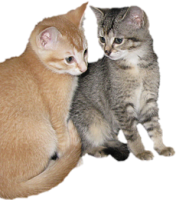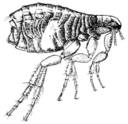Tapeworms and roundworms are the most common intestinal parasites of cats.
Tapeworms are long flat worms composed of many individual segments which look like wriggling grains of rice in cat faeces.
Round worms are much shorter and rounder and produce microscopic eggs. Hookworm and whipworm are rarer but cause anæmia, loss of protein and gastrointestinal upsets.
Cats are infested with the flea tapeworm Dipylidium caninum by eating fleas carrying the tapeworm during grooming. The tapeworm mature in cats and pass segments in the faeces which flea larvae ingest.
Cats are infested with the tapeworm Taenia taeniaformis when they eat infected rodents. Infestation with this worm is more common in hunting cats.
 Roundworms, Toxocara cati and Toxascaris leonine, are common in young cats and kittens. Cats are infested with roundworm by ingesting worm eggs passed in cat faeces or by eating animals such as mice, which are infested with roundworm.
Roundworms, Toxocara cati and Toxascaris leonine, are common in young cats and kittens. Cats are infested with roundworm by ingesting worm eggs passed in cat faeces or by eating animals such as mice, which are infested with roundworm.
Most kittens are infested with Toxocara cati through their mother’s milk.
Toxocara cati can infest children if they ingest eggs attached to kitten hair or dirty litter trains. The eggs hatch to larvae which migrate through the body and may cause damage. To prevent ingestion deworm kittens and cats as advised below, and dispose of litter and disinfect the tray with boiling water at least weekly.
Good quality broad spectrum wormers like Milbemax, Profender spot on and Drontal for cats are effective against all gastrointestinal worms.
Our recommended deworming protocol:
- Kittens from 4 to 12 weeks of age
- Treat every two weeks with Milbemax, Profender or Drontal for cats
- Young cats 3-6 months
- Treat monthly with Milbemax, Profender or Drontal for cats
- Cats 6 months of age and older
- Treat every three months with Milbemax, Profender or Drontal for cats



